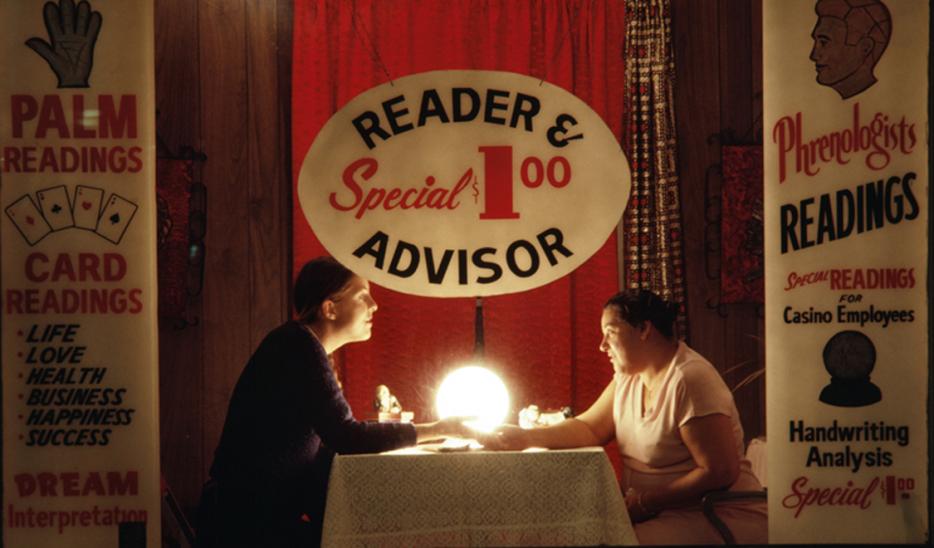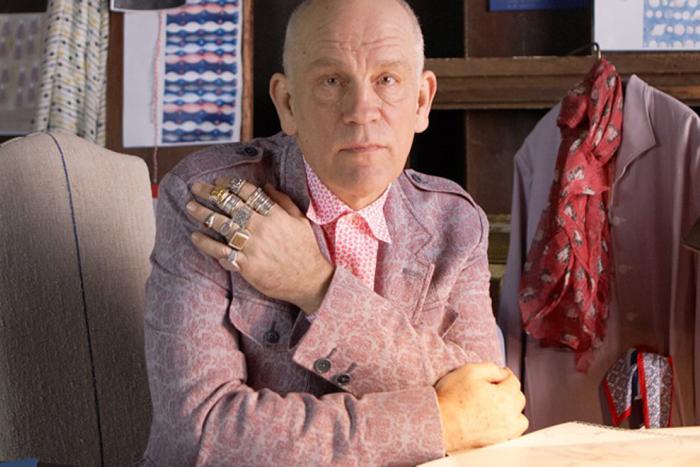In the essay that launched a thousand applications to Creative Nonfiction MFA programs, John Jeremiah Sullivan wrote about his secret belief in some benevolent clairvoyant advisor. This is a person (undoubtedly a wise old man) who “sits in a room in the bowels of some governmental building and actually knows what’s going to happen in the future, whose mutterings need to be heeded, whose moods must be tracked with concern if not alarm, and whose very existence is a cause all over the world of slight, constant anxiety, and properly so. Is this a dying spasm of the religion gene? Probably.”
The impulse to believe, against our better judgment, in the gentle guidance of someone who just knows is part of our collective psyche. Like Glinda in The Wizard of Oz, like the bald guy floating in a gooey bath who tells Tom Cruise how to navigate a murder charge in Minority Report, the wise, vaguely occult-ish sage is an archetype, and s/he fulfills a need. This explains the role astrology—and, more recently, tarot cards—play in my life. And I have discerning taste in Glindas: for daily matters, Susan Miller’s horoscopes are my everything; for special occasions, I turn to Darby Gibbs, a tarot card reader based in Toronto.
We all know how this stuff works; multiple studies have proven that astrology and tarot card readings rely on confirmation bias, the tendency to accept information that merely confirms what we already believe. I know this. I accept this. I just don’t care.
In this post-Oprah climate of pop spirituality, there’s room for a new leader with a daily pulpit, and it might be Susan Miller. A New York profile said it best: “if you’ve heard about her before now, you’re probably a fan.” She is as mindbogglingly prolific as she is disturbingly accurate. Her monthly horoscopes, available on AstrologyZone.com, are thousands of words long; her daily iPhone app is the first thing I read when I wake up in the morning. In non-chronological order, here is a list of some things Susan has predicted in my life: the pregnancy of a former boss. A fight with a friend. The success of a professional event. The relative failure of another professional event. A job. A raise. A death. If Susan says not to sign anything, no pen touches paper.
Susan’s writings are intensely personal and strangely emotional. The phrase “Dear Cancer” shows up a lot, as in, “The moon is your ruler, dear Cancer.” She doesn’t write the kind of horoscopes found in free newspapers—she writes horoscopes as love letters. She provides, if not a foolproof method for predicting the immediate future, some gentle, comforting guidance for her readers as we navigate our lives. If she can’t tell me how to get through life, she can at least satisfy my desire for someone who could.
A horoscope can’t really talk to you, though, no matter how loving the tone; it can’t participate in endless debates about what it all means, as though my life is a think piece on Spring Breakers. That’s where Darby enters, stage left. I first met Darby Gibbs at the Junction Flea, where she gave me a quick tarot card reading for a mere ten dollars. I was hooked immediately by her style of speaking: slow, but not slow in speed—more like she placed a specific value on each letter of every word. My “quick reading” was at least 20 minutes long, and I knew I wanted more.
Her apartment was surprisingly minimalist. A vintage baby doll was hanging out with vintage china plates in an exposed cupboard, and a record player was playing tinny piano music that I recognized but couldn’t place. I sat on a red velvet chaise while she laid my cards out on a black steamer trunk covered in candles. She offered me a glass of red wine and a cigarette, which I happily accepted. For my reading, Darby used the Visconti deck of tarot cards, a deck that originated in the 15th century. The characters are depicted like people in Renaissance Classicism paintings, and in the candlelight they looked almost holographic.
Afterward, I felt like I’d ended a particularly productive session with a therapist: tentatively energized for the future and at peace with my present. I told Darby as much, and she nodded like someone who hears it all the time. “A lot of people who get readings just want to be heard,” she said. “They want somebody that will listen to them and walk them through their own life.” I asked her if she ever feels like a shrink. “Oh, all the time. I feel more like a therapist or a counselor than I do a tarot card reader.” We pause for sips of wine. “But it’s also about telling a story. It’s a performance art... I rely on the cards for a direction in a conversation, but I think that most people already know what they’re going to say.”
It was that other patron saint of personal essays who said, famously, that we tell ourselves stories in order to live. “We live entirely, especially if we are writers, by the imposition of a narrative line upon disparate images, by the ‘ideas’ with which we have learned to freeze the shifting phantasmagoria which is our actual experience,” Joan Didion writes in The White Album. Storytelling makes sense of a world seemingly full of chaos; and tarot, just like astrology, is storytelling.
The first time I got my cards read by Darby, she scared the hell out of me by pressing her hands over her mouth and taking an endless pregnant pause. “I’m seeing a lot of aloneness,” she said finally. “You think you have others with you on your side, on your journey, but you don’t. You’re on a solitary journey.”
Her silence was worse than her prediction because—well, of course. Who isn’t alone out there? Our fairytales and blockbuster movies confirm it: the protagonist takes her journey alone, with gentle guidance from good witches and kind advisors. But no story fascinates us more than our own.






